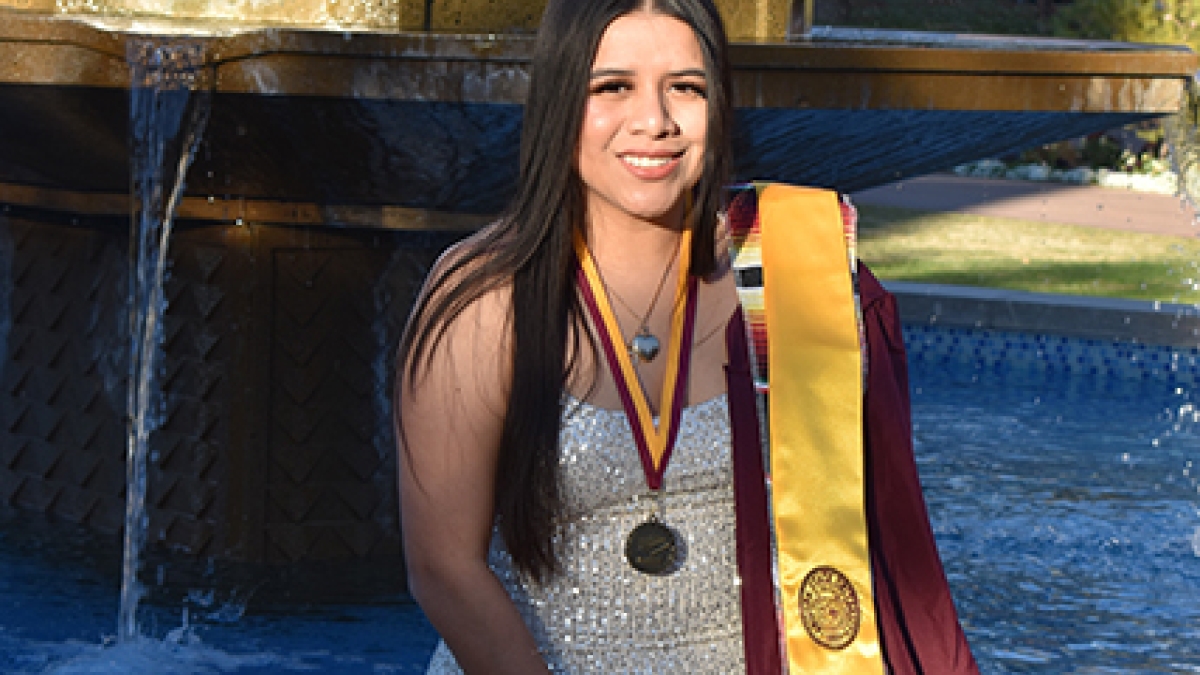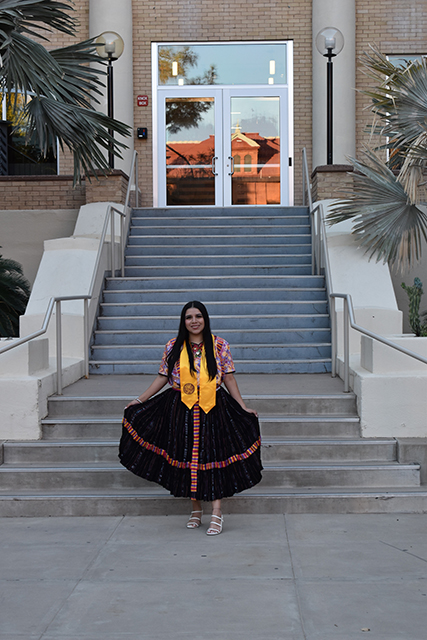Global health student has a passion for helping others

Alicia Marisol Hernandez
Editor’s note: This story is part of a series of profiles of notable fall 2022 graduates.
Alicia Marisol Hernandez is a first-generation college student and graduates this fall with a Bachelor of Arts degree in global health from the School of Human Evolution and Social Change.
“I decided to major in global health because I knew I was interested in health issues around the world and how this affects communities,” Hernandez said.
Hernandez is a Teach for America Campus ambassador, obtaining a minor in family and human development and was a recipient of a New American University Scholarship.
“I had a very positive undergraduate experience here at SHESCSchool of Human Evolution and Social Change and I would like to give a big thank you to SHESC faculty and staff for all the support and love I have received from them throughout my entire educational career,” Hernandez said.
“As a first generation student I would also like to thank my parents, they both taught me the value of education and pushed me to pursue higher education, which is one of the main reasons I am here. They also taught me to work hard, be ambitious and strive for more and I am forever grateful for this.”
We spoke with Hernandez about her experiences at ASU.
Note: Some answers have been edited for clarity.
Question: Why did you choose ASU? And specifically why did you decide to major in global health?
Answer: I decided to attend Arizona State University because the university offers the global health major and was convenient to me when it came to financial and housing factors. I decided to major in global health because I knew I was interested in health issues around the world and how this affects communities.
Q: What was your “aha” moment when you realized you wanted to study the field you majored in?
A: My "aha" moment was during my first fall semester in the class Intro to Global Health class (ASB 100). I really enjoyed the course material and the lectures and realized it was what I wanted to study.
Q: What’s something you learned while at ASU — in the classroom or otherwise — that surprised you or changed your perspective?
A: I participated in the School of Human Evolution and Social Change Early Start program with Lecturer Rhian Stotts. I quickly realized the strong support the school offers and how much professors within the school care about their students and are passionate about the global health field. This changed my perspective and made me super grateful for the opportunities and support system I have here at ASU.
Q: Which professor taught you the most important lesson while at ASU?
A: I took Medical Anthropology and participated in the Inclusive Human Learning group apprenticeship with Professor Daniel Hruschka, and he taught me the most important lesson at ASU.
He taught me to be considerate of everyone and be available for support. He taught me I could support other students through my academic career and to always help people in need if I am available to. Also, academically, he taught me there is so much unknown information and research within health inequalities in ethnic groups around the world. He taught me how complex this research can be but how important it is from a global perspective. Overall, I enjoyed all the coursework and research from Professor Hruschka and he has been a very supportive professor to me.
Q: Was there a particular global health course that you enjoyed?
A: Honestly, I enjoyed all the global health courses I took, however, I remember specifically enjoying ASB 205 Poverty and Global Health and TCL 323 Latina/o Health Issues. I really enjoyed these courses because they align with topics I am passionate about and want to work on in the future.

Q: Can you tell me about being a Teach for America Ambassador, and how you became involved in this organization?
A: I became involved in Teach for America through a friend who was an ambassador. I applied for the Teach for America Campus ambassador position this summer and have been participating since the start of this fall semester. I enjoy this role because I conduct classroom and student organization presentations which has bettered my public speaking skills and I enjoy letting students know about open opportunities they can participate in. I have also been a fellow at St. Vincent de Paul and have participated in a couple Americorps internships throughout college. I urge students to look for opportunities and extracurriculars they will enjoy and learn in.
Q: What’s the best piece of advice you’d give to those still in school?
A: The best advice I can give someone still in school is to advocate for yourself. Believe that you will pass your exams and courses and get to where you want to be. Advocate for yourself by involving yourself in things you are interested in, always search for opportunities that align with your interests and passions.
Q: What are your plans after graduating?
A: I plan on continuing my educational career and attend the University of Arizona to receive a master's degree in public health while continuing my current extracurricular activities and working on health education.
More Arts, humanities and education

Grand Canyon National Park superintendent visits ASU, shares about efforts to welcome Indigenous voices back into the park
There are 11 tribes who have historic connections to the land and resources in the Grand Canyon National Park. Sadly, when the…
ASU film professor part of 'Cyberpunk' exhibit at Academy Museum in LA
Arizona State University filmmaker Alex Rivera sees cyberpunk as a perfect vehicle to represent the Latino experience.Cyberpunk…

Honoring innovative practices, impact in the field of American Indian studies
American Indian Studies at Arizona State University will host a panel event to celebrate the release of “From the Skin,” a…